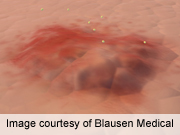
WEDNESDAY, May 30 (HealthDay News) — Nearly one in four people develops hives at some time or another, and they can be triggered by hot summer weather.
Hives are itchy, red or white bumps, welts or patches on the skin. The condition can be acute or chronic, according to the American Academy of Allergy, Asthma & Immunology.
Acute hives, which can last less than a day or up to six weeks, are likely a reaction caused by contact with an allergen such as food, animal dander, insect bite, pollen or latex.
Other possible triggers included medications, heat, stress, exercise, chemicals or viral infection.
The academy says you should consult with your doctor to identify the cause of acute hives.
Most people with chronic hives have symptoms that last longer than a year. Allergies cause only a small percentage of chronic hives. In most cases of chronic hives, the exact cause can’t be identified. This means that routine testing such as general blood counts or screens are not cost-effective and don’t help in planning treatments to relieve symptoms, according to an academy news release.
Hives are not contagious, and most cases get better on their own. Doctors may advise patients to avoid hot baths and showers, wear loose-fitting clothing, or take antihistamines to reduce itching and swelling.
Corticosteroids are prescribed for people with severe flare-ups of hives. In rare cases, hives can be a symptom of a life-threatening allergic reaction called anaphylaxis. Call 911 if you or someone else experiences hives along with any of these symptoms: fainting, shortness of breath, tightness in the throat, tongue/face swelling, or wheezing, the academy said.
More information
The American Academy of Dermatology has more about hives.

